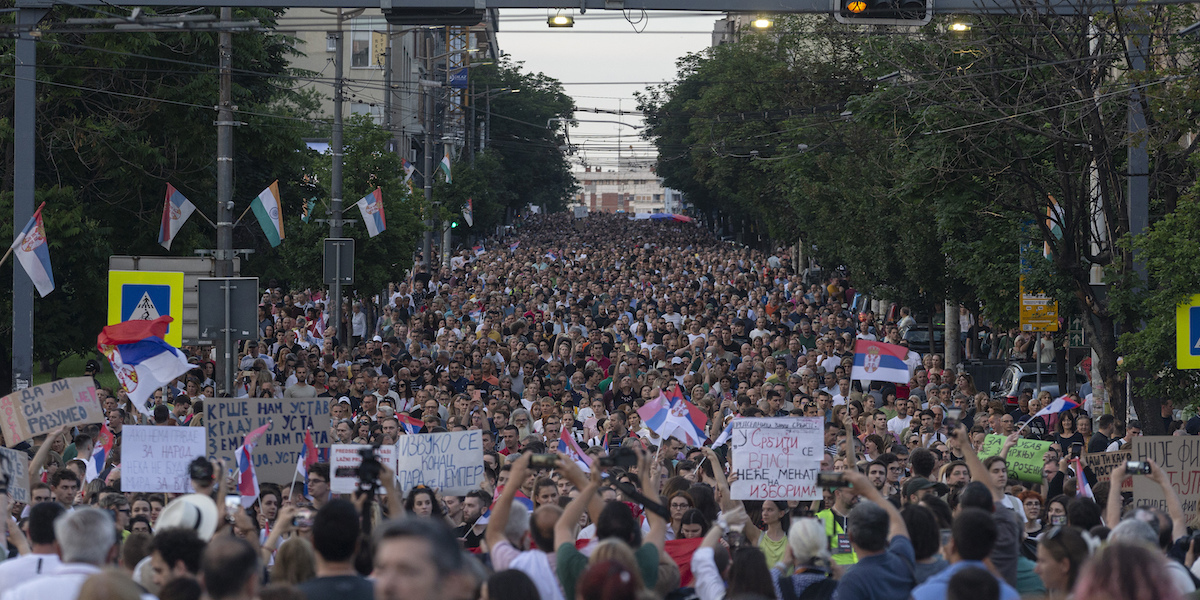Loading player
In early May, after two mass shootings in the space of a few days, demonstrations were organized in Serbia to demand tougher laws against gun sales, and against a popular culture of glorifying violence which according to some is very present in various levels of Serbian society. Since then those protests have widened: every Saturday in the main Serbian cities, especially in the capital Belgrade, they parade thousands of people to protest against the government and the president Aleksandar Vučić, accusing them of restricting the freedom of opinion and the spaces of the opposition.
Second Euronews the protests of these days are the largest since those that in 2000 prompted the then president Slobodan Milošević to accept the defeat suffered in the general elections of 2000. The following year Milošević was then arrested and extradited to the Netherlands: for years he had been accused of genocide, war crimes and crimes against humanity committed during the war in Bosnia and Herzegovina.
In Serbia, Vučić’s opposition had often tried to organize mass anti-government protests in recent years, but for various reasons none had ever taken hold. “These protests are something new and different from those of previous years. People who have various political opinions and belong to different generations and social classes are taking to the streets.” he said a Balkan Insight Robert Kozma, opposition parliamentarian and leader of the protests of these days.
A huge rally in Belgrade has just started. This week it’s not only Belgrade. Protests have moved also to Novi Sad, Niš and Kragujevac.
— Ivana Stradner 🇺🇸🇺🇦 (@ivanastradner) June 17, 2023
Serbia is a country that in many ways is in limbo. For years, it has maintained a policy of equidistance between the European Union, to which almost all the countries of the Balkan peninsula belong or aspire to belong, and Russia, with which Serbia traditionally has important cultural and economic ties. To date it is the only European country that has not joined the sanctions against Russia decided by the European Union after the invasion of Ukraine.
It is one of the countries with the most stable economy in the region, but it will hardly be able to aspire to join the European Union – and further improve its economic conditions – before resolving the territorial issues linked to Kosovo and Montenegro, two countries that never officially recognized after their proclamations of independence from the Serbian state.
For ten years, Serbian politics has been dominated by Vučić. He is 53 years old and has a past as a radical nationalist: he was a minister during the Milošević administration. He became prime minister in 2014 and has been the country’s president since 2017. In 2022, he was re-elected by a large margin.
Even if the president in Serbia has mainly formal powers, in recent years Vučić has managed to enormously consolidate the control exercised by his party over Serbian politics and society thanks to his role. TV and newspapers, both public and private, are pieni di persone vicine a Vučić, which uses rhetoric similar to that of other authoritarian Eastern European governments on the rights of migrants and the LGBT+ community. Last year, the Serbian government canceled EuroPride, the international demonstration for the rights of people belonging to the LGBT+ community, citing pressure from right-wing parties and the very powerful local Orthodox Church. Some members of the opposition they accuse moreover, the government to have links with the criminal gangs responsible for violence, extortion and illegal trafficking in various parts of the country.
The demonstrators in recent weeks are protesting both against the indirect control that Vučić has imposed on the media, and more generally for the climate that has been created against those who oppose the government and its policies. “The government spreads poison and fear throughout Serbia: time is on our side, and no matter how long we take, we will go ahead and pursue our goals,” told to Reuters last Saturday a protester, the economist Vladimir Savic.
The protesters are asking in particular that the government remove the frequencies of two private pro-government TV stations, Pink and Happy TV, that it guarantee greater freedom for the opposition newspapers – according to some calculations there are only two left – and that both the chief of intelligence and the Minister of the Interior for the management of violence and crime, defined as not very effective.
It is not clear exactly what developments there may be soon. Prime Minister Ana Brnabić, very close to Vučić and considered one of the most dialogue figures in the government, offered to welcome the demonstrators and listen to their proposals: to date, however, the demonstrators have refused, first asking for concrete steps by the government. Vučić hinted that he could call early elections to test his consent, but has not yet officially confirmed it.
